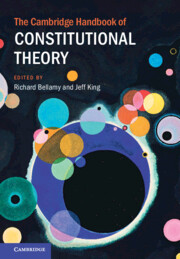Book contents
- The Cambridge Handbook of Constitutional Theory
- The Cambridge Handbook of Constitutional Theory
- Copyright page
- Contents
- Figures
- Contributors
- Frontispiece
- Preface and Acknowledgements
- 1 Introduction
- Part I Values
- Part II Modalities
- Part III Institutions
- Part III. A The State
- Part III. B The Executive
- Part III. C The Democratic System
- 41 Constituent Assemblies
- 42 Citizenship
- 43 Elections
- 44 Political Parties
- 45 Legislatures
- 46 Referendums
- 47 Citizens’ Juries/Minipublics
- Part III D The Legal System
- Part III E The Global System
- Part IV Challenges for Constitutional Democracy
- Bibliography
- Index
- References
45 - Legislatures
from Part III. C - The Democratic System
Published online by Cambridge University Press: 27 March 2025
- The Cambridge Handbook of Constitutional Theory
- The Cambridge Handbook of Constitutional Theory
- Copyright page
- Contents
- Figures
- Contributors
- Frontispiece
- Preface and Acknowledgements
- 1 Introduction
- Part I Values
- Part II Modalities
- Part III Institutions
- Part III. A The State
- Part III. B The Executive
- Part III. C The Democratic System
- 41 Constituent Assemblies
- 42 Citizenship
- 43 Elections
- 44 Political Parties
- 45 Legislatures
- 46 Referendums
- 47 Citizens’ Juries/Minipublics
- Part III D The Legal System
- Part III E The Global System
- Part IV Challenges for Constitutional Democracy
- Bibliography
- Index
- References
Summary
This chapter explores the nature of the legislature and its relationship to constitutional government, focusing in particular on the importance of legislative agency and the dynamics that frame its exercise. The chapter begins by reflecting on the objects of legislative action, arguing that authorising a legislative assembly to legislate changes who legislates but not what it is to legislate. The object of legislative deliberation and action should be the common good and securing this end requires agency. The assembly faces many challenges in exercising agency, which it is structured to overcome, partly by way of its relationship to government, a relationship that goes well beyond acts of legislation. The relationship between legislature and government shapes the character of a constitutional order and bears on the relationship between legislature and the people. The legislature’s duty is to represent the people, which makes self-government possible. The legislature should deliberate and act for the people and be accountable to the people, with legislative deliberation taking its place in a wider public conversation. The legislature’s capacity for agency informs how legislative acts should be understood to change the law and helps explain the moral importance of legislative freedom and the limits on that freedom.
Keywords
- Type
- Chapter
- Information
- The Cambridge Handbook of Constitutional Theory , pp. 792 - 809Publisher: Cambridge University PressPrint publication year: 2025

